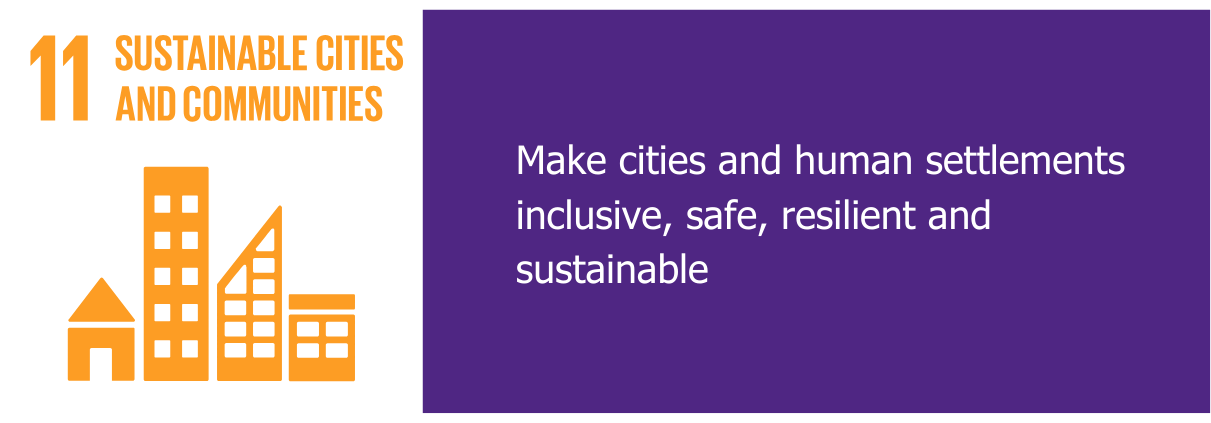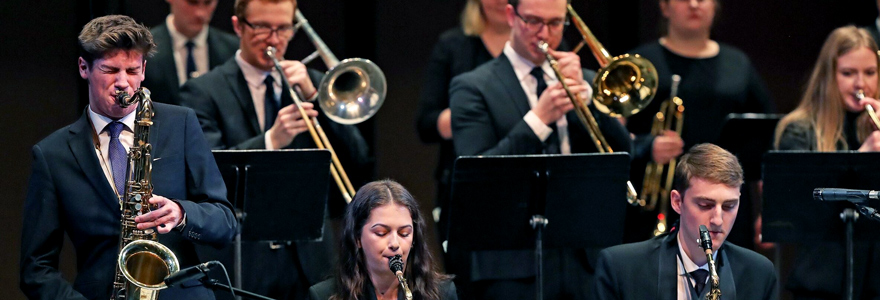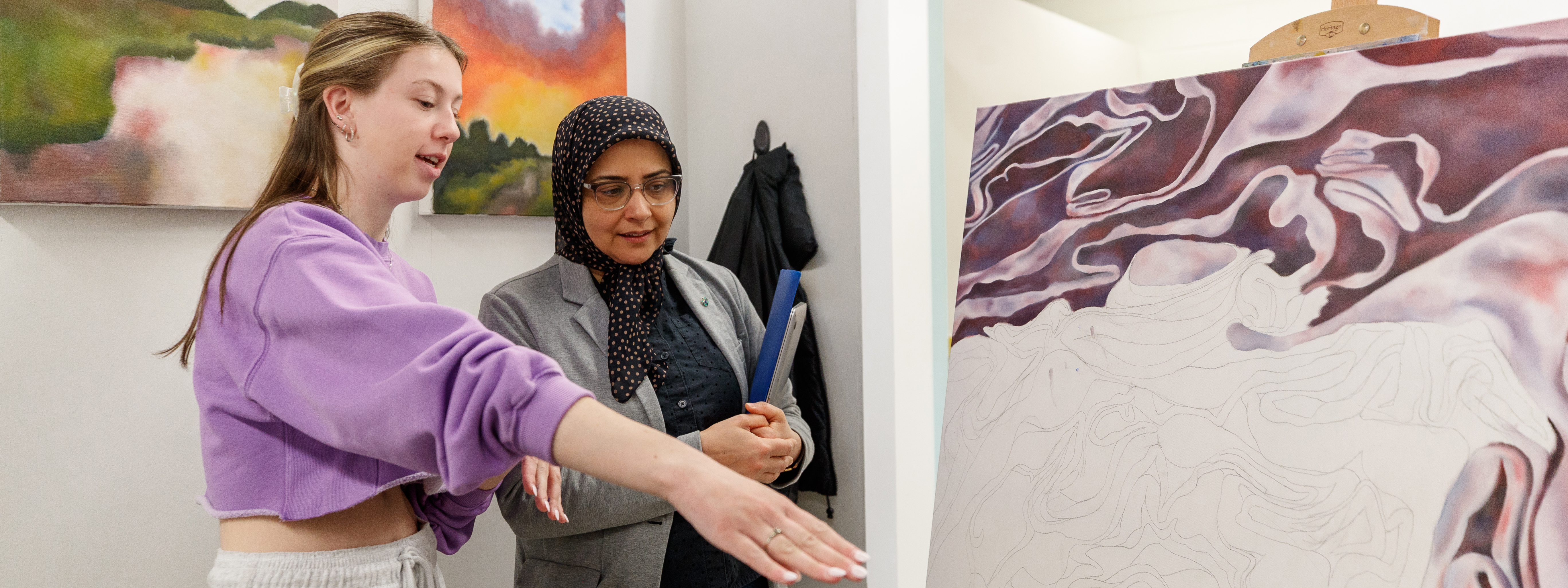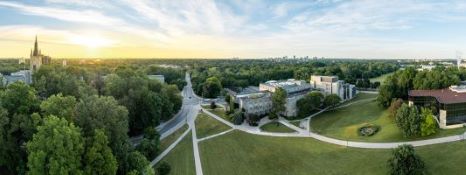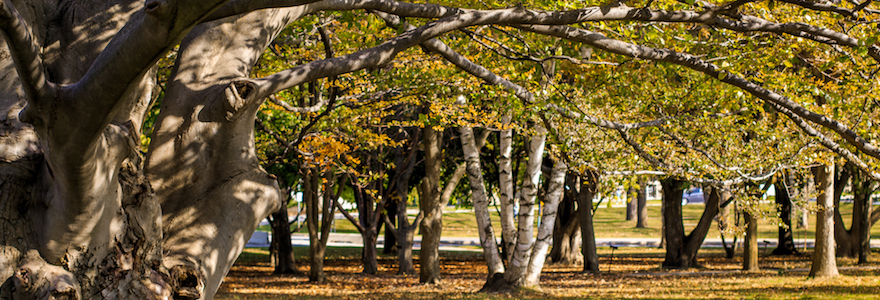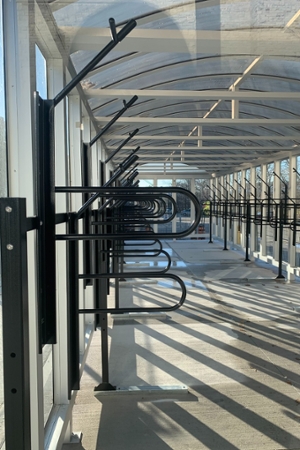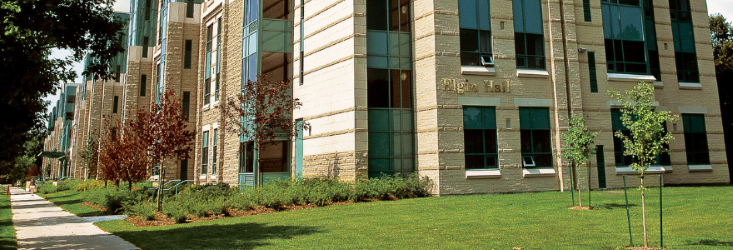SDG 11 - Strategic Initiatives
Performance Arts
Western University plays a vital role in enriching the local arts scene through a wide range of public performances and cultural programming. These events are open to the public, generally free, and span music, theatre, dance, visual arts, and interdisciplinary collaborations. The Don Wright Faculty of Music alone hosts more than 350 musical performances annually, typically welcoming more than 20,000 members of the community each year for concerts, outreach programming, and special events.
Musical Performances
- Chamber Music Series: The recitals feature instrumental music performed by small ensembles of current music students.
- Don Wright Faculty of Music Upcoming Events: Discover upcoming musical performances.
- Ensembles and Performance Groups: Award-winning choral and instrumental groups perform a range of repertoire from early music to jazz.
- Faculty and Guest Artist Concerts: A mix of free and ticketed concerts, often livestreamed, showcasing professional musicianship.
- Fridays@12:30: A weekly concert series featuring an eclectic mix of music from guest artists, faculty, and students, held in von Kuster Hall or online.
- High School Vocal Competition: An annual event that engages young musicians and the community through performance and mentorship.
- International Trombone Festival: More than 500 trombone players from around the world gathered in London to play music, hone their skills and celebrate their love of the blaring brass instrument.
- Live at the Don Wright Faculty of Music: Join us live online for a series of live concerts and special events.
- Masterclasses and Residencies: Visiting artists, educators, composers, and scholars offer public sessions that enrich both student learning and community engagement.
- Open Houses and Instrument Days: Western welcomes community members into our facilities to experience first-hand our exceptional people, resources, and instruction.
- Opera at Western: Full-scale operatic productions are presented twice annually at a nominal fee.
- Parsons and Poole Concert & Masterclass: The weekend event features a Friday-night concert by an internationally acclaimed pianist, followed by a Saturday masterclass with the artist.
- Special Events and Student Competitions: From concerts to music-making programs, guest artists enrich our students’ education and the London community.
- Music Events Calendar: Browse all upcoming events for more details.
Other Performances
- artLAB: Media exhibitions accommodate projects and initiatives that have the potential to engage with the Western community, as well as local, regional, and international cultural workers. Dozens of events are held annually.
- Dance Showcase: A performance to showcase the accomplishments of students in the Dance Minor program.
- Drama Production: Drawing students from all faculties, the Department of English engages students to perform, produce, and even compose as a team.
- Indigenous Artist-in-Residence: This program supports the creation and production of new artistic work.
- London Skydrive Airshow: Western sponsors this not-for-profit performance of aerial acrobatics in the local community.
- London Community Artists: Artwork by members of London Community Artists is displayed at Western Research Park on an ongoing basis.
- McIntosh Gallery Exhibitions: A year-round schedule of public exhibitions and programs in visual culture are open to the public at the McIntosh Gallery.
- Student Writer-in-Residence: Each year an undergraduate writer contributes to creativity across campus, including several performances.
- Summer Shakespeare at Western: The longest running outdoor performance of Shakespeare in Canada.
- Theatre Western: This student club engages with undergrad students to perform and produce several professional level theatrical events annually.
- Western Events Calendar: A searchable calendar that highlights upcoming public performances across disciplines.
Public Access: buildings, museums, cultural spaces, landscapes
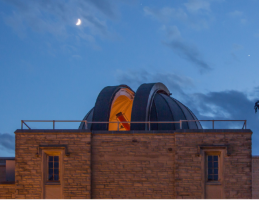 Western University
Western University 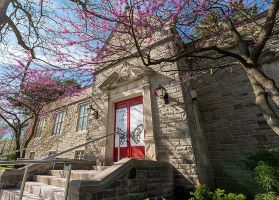 offers free public access to all cultural spaces on its campus, including museums, galleries, and exhibition areas. These venues provide opportunities for the community to engage with science, art, and history. Each space is open to the public and showcases unique collections, exhibitions, and programs that contribute to education and cultural enrichment.
offers free public access to all cultural spaces on its campus, including museums, galleries, and exhibition areas. These venues provide opportunities for the community to engage with science, art, and history. Each space is open to the public and showcases unique collections, exhibitions, and programs that contribute to education and cultural enrichment.
- Archives and Special Collections: Located in the D.B. Weldon Library, this collection houses rare and unique materials including books, monographs, serials, and manuscripts. With a strong emphasis on the history of Southwestern Ontario, the Archives are open to the public for research, educational use, and personal exploration. Visitors can engage with primary sources that illuminate the region’s cultural and historical development.
- ArtLab at Western University: Situated in the John Labatt Visual Arts Centre, ArtLab is Western’s contemporary art gallery and experimental exhibition space. It features rotating exhibitions of student and faculty work, as well as curated shows that explore current themes in visual culture. Open to the public throughout the academic year, ArtLab fosters dialogue between the university and the broader community through art.
- Cronyn Observatory: Established in 1940, the Hume Cronyn Memorial Observatory is a historic facility that offers free public stargazing nights, astronomy talks, and educational programming. Visitors can explore the observatory’s period rooms and telescopes, gaining insight into both the science and history of astronomy. It serves as a bridge between scientific discovery and public curiosity.
- McIntosh Gallery: Founded in 1942, McIntosh Gallery is Ontario’s oldest university art gallery and a vital part of Western’s cultural landscape. It presents exhibitions of contemporary and historical art, often featuring work by Canadian and international artists. The gallery is open to the public free of charge and offers educational programs, artist talks, and special events that foster dialogue around visual culture and art history.
- Sherwood Fox Arboretum: This living collection of trees and shrubs is located across campus and named in honour of former Western President Sherwood Fox. The Arboretum supports biodiversity and environmental education, offering a peaceful and scenic environment for walking, learning, and reflection. It is freely accessible year-round and used for both academic study and public enjoyment.
- St. John’s Chapel: A serene and inclusive space, St. John’s Chapel is open 24 hours a day, seven days a week. It welcomes individuals of all faiths and backgrounds for prayer, meditation, and quiet reflection. The chapel plays a vital role in supporting spiritual wellness and community connection on campus.
- University College: As one of the oldest and most iconic buildings at Western, University College is a landmark of architectural and historical significance. Its Gothic Revival design and central location make it a popular site for photography and campus tours. The building symbolizes Western’s academic heritage and is open to the public for viewing and events.
- Visit Campus Program: Western University invites the public to explore its 1,300+ acre campus, renowned as one of the most beautiful in Canada. The campus features a blend of modern and historic architecture, ample green space, and accessible walking paths. Free guided campus tours are available and led by current students, offering insights into faculty buildings, residences, libraries, and other key locations. Visitors can also take advantage of virtual tours and interactive maps to plan their visit or explore remotely.
- Wampum Learning Lodge: This intercultural public space is dedicated to Indigenous knowledge, featuring the sacred Ceremonial Arbour for respectful gatherings. The Lodge advances Reconciliation, Indigenization, and decolonization through collaborative programs with Indigenous communities and Western’s Office of Indigenous Initiatives.
- Western Libraries: All five campus libraries are open to the public for browsing and quiet study. Community members can access a wide range of academic resources and may apply for free guest borrowing privileges. The libraries serve as inclusive spaces for learning, research, and intellectual exploration.
Through these venues, Western provides free access to its museums and galleries, meeting the highest standard for public cultural accessibility.
Public Access: libraries, books, and publications
Western University provides automatic free public access to its libraries for browsing and on-site use of collections. Members of the public are welcome to visit any of Western’s libraries to explore books, journals, and other resources without needing to register in advance.
For guest borrowing privileges community members can apply for a Guest Borrower Card. There are no borrowing fees, and the process is designed to be accessible and inclusive.
In addition to physical access, Western also supports public engagement through:
- E-books, accessible through the Library Catalogue,
- On-campus access to select electronic resources, where licensing permits,
- Open access digital content, including research publications and educational resources,
- OpenEdu, offering free learning materials for students, educators, and the broader community.
In 2023-24 more than 5M library items were accessed!
Green Spaces
Western University provides free public access to its open spaces and green spaces, welcoming community members and visitors to explore and enjoy the natural environment across campus. The campus is not only a place of academic excellence but also a vibrant ecological and recreational landscape that supports biodiversity, sustainability, and public engagement. Key features include:
- Expansive Natural Grounds: Western’s campus spans nearly 500 hectares within the Carolinian Life Zone, Canada’s most biodiverse region.
- Deshkan Ziibi (Thames River): Flowing through campus, the river supports diverse wildlife, including the at-risk spiny softshell turtle, and offers scenic walking and cycling routes.
- Green Spaces and Gardens: Western strives to sustainably maintain green spaces, including the protection of natural and wetland areas, land restoration, ecological landscaping, pollinator friendly raingardens, and invasive species management.
- Medway Valley Heritage Forest: This Environmentally Significant Area (ESA) enhances the university’s ecological value and provides additional green space for public enjoyment.
- Sherwood Fox Arboretum: A living collection of trees and shrubs located across campus, the Arboretum is used for scientific research, education, and conservation. It is freely accessible to the public and contributes to the biodiversity and beauty of Western’s landscape.
- Campus as a Living Lab: This initiative brings together faculty, staff, students, and community partners in support of biodiversity conservation, visual arts, land restoration and improved energy systems, among other research and project areas.
- Thames Valley Parkway Access: A popular multi-use trail that winds along the river and directly through campus, used by walkers, runners, and cyclists from the broader community.
- Open Space Strategy: Western’s planning framework emphasizes the preservation of natural landscapes and affirms that open spaces are central to the university’s identity and public accessibility.
- Green Campus Tours: Visitors are invited to explore the campus through free in-person or virtual tours, offering insights into both its natural and built environments.
Record and Preserve Cultural Heritage
Western University is deeply committed to preserving and promoting intangible cultural heritage, including local folklore, traditions, languages, and knowledge. Through a wide range of projects and partnerships, the university supports the documentation and celebration of cultural heritage at the local, national, and international levels, including the heritage of displaced communities.
Local and Regional Cultural Heritage
- Archives and Special Collections: Western is dedicated to acquiring, preserving, and providing access to special collections and archives. Particular focus is put on the local history of southwestern Ontario, especially London and Middlesex County, as well as Canadian literature and history, Ontario’s private and small presses, Canadian travel and explorations, and provincial textbooks.
- Michael Newark Digitized Tornado Archive: A unique digital archive of tornado and wind event data in Canada, dating back to the 1700s, preserves local meteorological history.
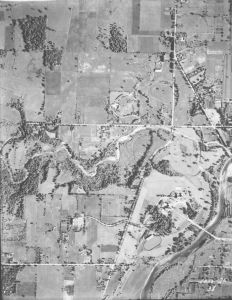
- Neighbourhood History Project: To preserve community heritage, local London stories are collected, shared, and presented at the London public library for the whole community to enjoy.
- Potters Field Monument: The monument is a project to commemorate hundreds of individuals buried in unmarked graves. Ingersoll Rural Cemetery will now contain a monument listing the names and stories: “where they came from, what they were doing when they were here.”
- Western Libraries Air Photo Collection: The collection protects and preserves tens of thousands of historical air photos of Southwestern Ontario, captured from 1922 to 2001. The images represent one of the largest air photo collections in Canada, and are a valuable archive of local history.
National Cultural Heritage
- Canadian Library’s Micro Gallery Project – Western: This project is a living art installation created as a memorial to missing and murdered Indigenous women and girls. Books, covered in Indigenous fabrics, have names imprinted on the spine in gold lettering, with invitations for visitors to learn more.
- Indigenous Language Revitalization: Western is actively involved in preserving Indigenous languages, which are a crucial part of Canada’s cultural heritage. This includes developing strategies and innovative approaches to language revitalization, such as using digital technologies and online platforms to enhance access to resources.
- Manuscript Fragments: This project preserves fragments of medieval manuscripts repurposed in early modern books, offering insights into historical bookmaking and cultural transmission.
- Museum of Ontario Archaeology: Located on the ancestral territory of the Haudenosaunee, Anishinaabe, and Munsee-Delaware First Nations of this region, the museum recognizes that it holds and cares for archaeological collections and material heritage from across the many First Nation Territories now called Ontario. It holds these collections as a public repository and in trust, seeking to work collaboratively in the care, access, decision making, and learning from this vital heritage record.
Heritage of Displaced Communities
- Black Londoners Project: A digital storytelling initiative that documents the lives, contributions,
and experiences of formerly enslaved Black individuals who fled the United States and settled London, in the mid-nineteenth century. The project uses interactive maps, archival materials, and oral histories to preserve and share this vital part of the region’s heritage.
- Biindigen's Indigenous History Month Challenge: Created by Western’s Indigenous Learning Circle to engage the Western community in learning about and celebrating Indigenous Peoples, perspectives, realities, histories, and cultures throughout the month of June; each day features a resource, event, or suggested activity.
- Surviving Memory in Postwar El Salvador: An international collaboration hosted by Western, this project partners with survivors, scholars, architects, artists, lawyers, museums, community organizers, local leaders, civil society organizations, and mental health professionals who are committed to documenting the history of the Salvadoran Civil War (1980-1992) and preventing future violence.
- Wampum Learning Lodge: This intercultural teaching, learning, and gathering space is designed with Indigenous epistemologies and pedagogies at its core. It facilitates and coordinates services and programming offered by Western’s Office of Indigenous Initiatives, advancing reconciliation, Indigenization, and decolonization, thereby preserving and promoting Indigenous cultural heritage.
Sustainable Commuting
Western has undertaken a wide range of actions to promote more sustainable commuting among students, staff, and faculty.
Busing, Carpooling & Shuttles
- City Bus Pass: A London Transit Bus Pass is included in all Western undergraduate students’ tuition. Graduate students are also part of the universal bus pass program. The pass allows students to take a bus for free anywhere in the city.
- Late Night Exam Shuttle: The University Students’ Council (USC) offers a free shuttle service to get students safely home after exams.
- Mustang on Demand: The USC offers this shuttle service during the academic year to transport students late at night.
- USC Grocery Shuttle: Hitch a ride with the USC every Tuesday from 5:30 to 8:30 pm. Our Grocery Shuttle will take you from campus to Food Basics grocery store and back.
- Western Carpool Program: In partnership with the City of London’s Regional RideShare platform, the program offers reserved parking, emergency ride home options, and complimentary parking vouchers.
Cycling Infrastructure
- Bike Lockers: Located throughout campus, these spacious lockers provide safety and protection for your bicycle and bike gear.
- Bike Parking Map: This map shows the location of the 20 bike lockers, shelters, covered racks, and rooms available for bikes. It also highlights buildings with showers for those who really work up a sweat when commuting.
- Bike Paths: The Thames Valley Parkway recreational trail is a scenic route, running along the Thames River. The part running through campus is marked on this campus map.
- Bike Repair Station: With funding from the Western Sustainable Impact Fund, a bike repair station will be installed near the secure bike shelter.
- Bike Routes to Campus: A map of preferred bike routes and tips for getting to campus from the surrounding area.
- Bike Share Program: With funding from the Western Sustainable Impact Fund, this pilot program will encourage campus community members to cycle more
- Secured Bike Areas: Two secure bicycle parking areas are available at no cost to Western students, staff, and faculty. These spaces are convenient, secure, weather-protected spaces, featuring solid steel lock bars for maximum security.
- Thames Valley Parkway Trail: A scenic, multi-use path connecting campus to the city’s cycling network.
Planning & Strategy
- Electric Vehicle Charging Stations: Western has installed 76 EV charging stations located in thirteen parking lots in preferential locations. Only electric vehicles that are plugged into a charging station are permitted to park in spaces designated with an EV parking sign.
- Open Space Strategy: This planning document includes prioritizing pedestrian access and creating a complete bicycle network with comprehensive, bike-safe routes.
Community Engagement
- Active & Safe Routes to School: A community-based initiative that promotes the use of active transportation to and from school, addressing health, physical activity, and traffic safety issues while taking action on air pollution and climate change.
- Annual Bike to Campus Day: This event focuses on spreading awareness and highlighting the benefits of active transportation. Connect with community and campus partners at the Bike Fair.
- Cycling Month at Western: For this initiative, students, staff, and faculty track their commute. The five participants with the top kilometres travelled win prizes.
- Sustainable Transportation Pitch Competition: Transportation is for everyone, and this event offered students a wide range of opportunities to explore transportation issues and propose sustainable solutions for the campus.
- Western Active Transportation Society: A multidisciplinary group of faculty, staff, and students at Western University who are passionate about researching and promoting safe cycling and walking as a means of transportation.
Measurement & Impact
- Commuting Behavior Tracking: Western collects data through surveys and Parking Services.
- Impact: Over 93% of Western students use sustainable commuting options, demonstrating strong uptake and cultural support for low-carbon travel.
Housing for Employees 
Western University supports its employees in finding affordable housing through several initiatives:
- Western University pays a living wage to its employees, allowing them to account for local living costs in London, Ontario.
- Faculty Relations has assembled this useful Guide to Housing in London. It lists houses or condos available to staff and faculty for rent or purchase.
- The Housing portfolio provides access to affordable, quality accommodations to students, staff, and visitors.
- Off-Campus Housing Services supports students and staff with their search for affordable accommodations.
Local Authority Collaboration Regarding Planning and Development
Western University actively collaborates with local authorities and community organizations to address urban planning challenges and improve access to affordable housing for students and local residents. These efforts span research, advocacy, and service delivery, reflecting Western’s commitment to inclusive and sustainable development.
- Centre for Research on Health Equity and Social Inclusion:
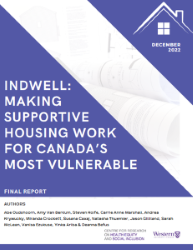 Western partnered with local authorities and Indwell, a non-profit housing provider, on a project focused on planning and developing affordable housing solutions for local residents.
Western partnered with local authorities and Indwell, a non-profit housing provider, on a project focused on planning and developing affordable housing solutions for local residents. - Centre for Urban Policy and Local Governance: This centre serves as Western’s hub for urban research and policy engagement. It facilitates interdisciplinary collaboration with municipal leaders and contributes to national and international projects such as the LoGov-RISE Project, which explores metropolitan governance and housing policy.
- Healthy City Active London: Western's Human Environments Analysis Laboratory produced evidence‐based recommendations for policies to promote walking and biking for the City of London.
- Human Environments Analysis Laboratory: The HEAL team provides their expertise to key stakeholder organizations such as the Middlesex-London Health Unit, the City of London Engineering Department, and the Trauma program at the London Health Sciences Centre to address traffic flow and road safety.
- Linking Health and the Built Environment in Rural Settings: This position paper providing evidence and recommendations for planning healthy communities in Middlesex County serves as a practical guide for implementing policies locally.
- Metro Vancouver Regional District Rental Affordability: Western Libraries hosts a Geospatial Hub that supports planning and development research through interactive mapping tools and spatial data resources.
- Off-Campus Housing Services: Western provides a centralized platform with over 5,000 verified listings annually, along with personalized support for international and exchange students seeking affordable accommodations.
- Student Housing Advocacy: Western’s University Students’ Council (USC) published a Student Housing Policy Paper advocating for expanded housing verification programs and improved access to safe, affordable off-campus housing.
- Youth Engagement in Urban Planning: Western researchers supported a youth participatory evaluation of the City of London’s Mobility Master Plan, empowering young people to contribute to planning decisions.
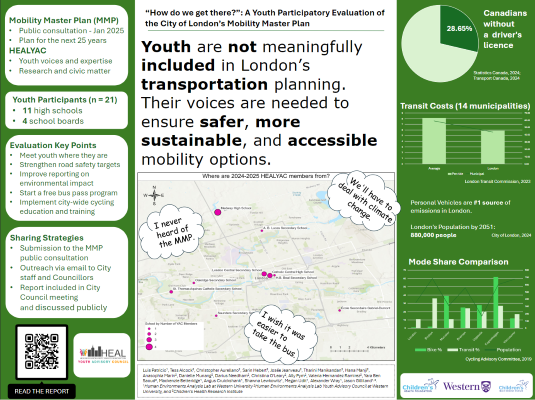
Affordable Student Housing
Western University is committed to providing affordable and accessible housing for students through a combination of direct housing options, financial support, and affordability assessments.
- Financial Assistance: Western provides financial support through a variety of loans, grants, bursaries, and work-study programs to overcome financial barriers.
- International & Exchange Students Housing Services: Contact us for personalized assistance with your housing search in London, Ontario if you aren’t in Canada yet.
- Off-Campus Housing Services: The #1 source for students and staff to find off-campus housing, with over 5,000 listings annually.
- On-Campus Residences: Rated #1 for student living by Maclean’s University Rankings in the Medical/Doctoral category for seven years in a row, our 12 residences offer a wide range of facilities and support services, providing homes to over 6,200 undergraduate students from 66 countries.
- Platt’s Lane Estates: A community of 170 townhouses on a park-like setting of nearly 20 acres, it is a warm and diverse community to call home during your academic career at Western.
- Services In Residence: Services include meal plans, front desk staff, laundry, internet, repairs, cleaning, garbage disposal, and mental health counselling.
- University Apartments: Our facilities are clean, convenient, comfortable, and affordable because we understand your needs not just as a tenant, but as a student.
Pedestrian Access
Western University is committed to creating a safe, accessible, and walkable campus environment. Through strategic planning and infrastructure investments, the university prioritizes pedestrian mobility as a core element of campus design and sustainability:
- Accessible Pedestrian Signals: Crosswalk signals are designed to provide safer passage at intersections for community members with visual impairment.
- Campus Master Plan: Our principle on transportation calls for safe and efficient networks to support pedestrian, bicycle, and bus traffic.
- Campus Pedestrian Walkway Tactile Plates: The bright red plates and yellow concrete ramps located at the edge of road crossings on campus provide cues for the visually impaired.
- Open Space Strategy: Pedestrian routes are public spaces that contribute to social life and academic dialogue and create impressions before other facilities can be assessed.
- UC Hill Capital Project: Enhancements to UC Hill augment mobility across campus and prioritize pedestrian and cyclist safety.
New Build Standards
Western University is committed to sustainable development and ensures that all new buildings and major renovations meet rigorous environmental standards. The university follows nationally and internationally recognized frameworks to reduce greenhouse gas emissions, improve energy efficiency, and promote long-term sustainability.
- Sustainable Design Guidelines:
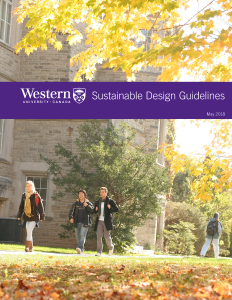 These guidelines for new construction and major renovation projects target a minimum of LEED v4 Silver certification. They incorporate LEED (Leadership in Energy and Environmental Design) standards for energy modeling, minimum energy performance, metering, and monitoring, with a strong focus on reducing greenhouse gas emissions in building operations.
These guidelines for new construction and major renovation projects target a minimum of LEED v4 Silver certification. They incorporate LEED (Leadership in Energy and Environmental Design) standards for energy modeling, minimum energy performance, metering, and monitoring, with a strong focus on reducing greenhouse gas emissions in building operations. - Environment & Sustainability Policy: This policy lists the scope, principles, and objectives to build and renovate facilities in accordance with energy efficiency and sustainability principles.
- Capital Projects: Western has several capital projects underway at any given time. Our upcoming renovations will be assessed using the performance standards outlined in the Sustainable Design Guidelines.
- LEED Certified Buildings: Western currently has 13 LEED-certified buildings, demonstrating its long-standing commitment to green building practices.
- Net-Zero Energy Building: The Ronald D. Schmeichel Building for Entrepreneurship and Innovation was intentionally designed to achieve net-zero energy performance, making it Western University’s first building of its kind. The building is currently pursuing formal net-zero designation, reinforcing its role as a model for future development.
Brownfield Sites
Western University is committed to sustainable development and prioritizes the reuse and revitalization of previously developed land (brownfield sites) for new construction and major renovations. Western adheres to various standards and regulations to ensure environmentally responsible development. This approach reduces environmental impact, preserves green space, and aligns with the university’s broader sustainability goals. Policies and practices that guide our building and development projects include:
- Deep Energy Retrofit Program: DERP exists to renovate older buildings on campus to improve their energy efficiency and reduce emissions. On average DERP projects result in a 60%-80% reduction in emissions per building. Western aims to complete 1-2 DERP projects per year. Recent projects include Siebens-Drake Research Institute (completed 2024) and Western Student Recreation Centre (completed 2023).
- Leadership in Energy & Environmental Design: Western aims for LEED certification in building projects, ensuring that buildings are designed and constructed using strategies aimed at improving performance across key metrics such as energy savings, water efficiency, CO2 emissions reduction, and improved indoor environmental quality.
- Ministry of the Environment, Conservation and Parks: The Ministry provides guidelines and regulations that Western University adheres to in its building projects. This includes ensuring that all developments comply with environmental protection standards and contribute to the conservation of Ontario’s natural resources.
- Ontario Environment Assessment Process: Western adheres to this process which promotes responsible environmental decision-making. This process includes the preparation and review of environmental assessments to ensure that potential environmental effects are considered before any infrastructure project begins.
- Sustainable Design Guidelines: The guidelines establish minimum performance criteria for buildings and sites, aiming to reduce greenhouse gas emissions, improve human health, and support thriving ecosystems. The guidelines are aligned with Ontario’s Climate Change Action Plan and aim for at least LEED Silver certification for all new construction and major renovations.
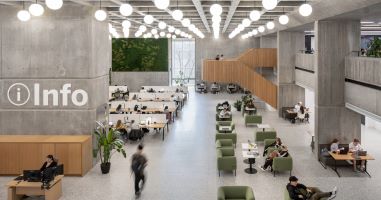
- Completed Projects:
- Siebens Drake Research Institute Retrofit: Updated as part of the Deep Energy Retrofit Program, the project replaced outdated chillers and connected the building to Western’s energy loop.
- Weldon Library Revitalization: Originally built in 1967, the library was transformed to include a Learning Commons and increase study seats. The project received international recognition.
- Western Student Recreation Centre Gym addition: A retrofitted gym opened for student access to adapt to an evolving and growing student body.
